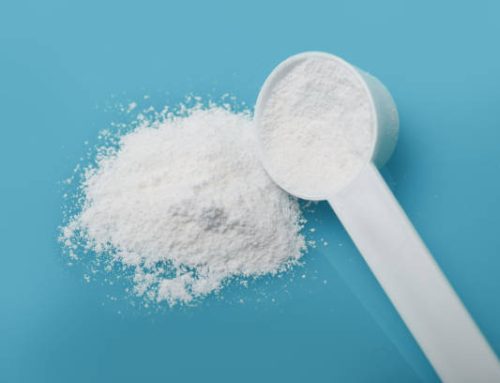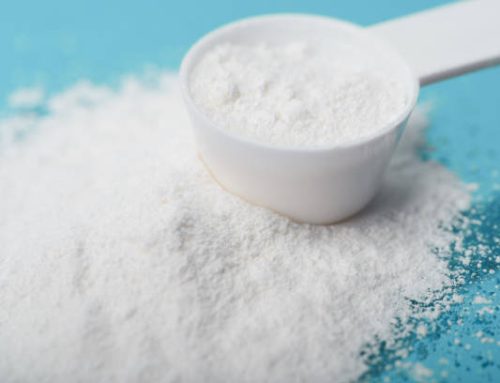As athletes, we all want to constantly improve our performance, to run faster, jump higher, or lift heavier weights. We push through grueling workouts, fuel our bodies with wholesome nutrition, and invest in the latest gear, all in pursuit of the ultimate prize: winning. But what if there was a way to enhance our athletic abilities from within, through a simple and affordable supplement? Enter beta-alanine, a non-essential amino acid that has been shown to boost endurance, strength, and power in athletes of all levels. In this article, we will explore the science behind beta-alanine, its benefits and potential side effects, and how to incorporate it into your training regimen for optimal results. So fasten your seatbelt and get ready to explore the power of beta-alanine, the hidden gem of athletic performance enhancement.

1. Beta-Alanine: The Key to Unlocking Athletic Performance
Beta-alanine is an amino acid that has become increasingly popular among athletes and fitness enthusiasts. It is one of the key ingredients in pre-workout supplements due to its ability to enhance athletic performance. Beta-alanine does this by increasing the levels of carnosine in the muscles, resulting in delayed fatigue and increased endurance.
Studies have shown that beta-alanine supplementation can increase muscle carnosine levels by up to 80% within four weeks. This is beneficial for high-intensity exercises that rely heavily on the anaerobic energy system, such as sprinting or weightlifting. Beta-alanine has also been shown to improve muscle power output, enabling athletes to perform at a higher intensity for a longer period of time.
One of the key benefits of beta-alanine is its ability to buffer lactic acid buildup in the muscles. Lactic acid is produced during intense exercise and causes fatigue, burn, and muscle soreness. By increasing carnosine levels in the muscles, beta-alanine can help delay the onset of lactic acid buildup, allowing athletes to exercise for longer periods of time without experiencing fatigue.
In addition to its ergogenic effects, beta-alanine has also been shown to have antioxidant properties. This makes it beneficial for reducing oxidative stress caused by intense exercise, leading to faster recovery and decreased muscle damage. Beta-alanine has also been linked to improvements in body composition, with some studies suggesting that it can help reduce body fat while preserving lean muscle mass.
Overall, beta-alanine is a highly effective supplement for athletes and fitness enthusiasts looking to unlock their full athletic potential. Whether you’re a sprinter, weightlifter, or endurance athlete, beta-alanine can help improve your performance and take your training to the next level. With regular supplementation, you can expect increased endurance, delayed fatigue, improved muscle power output, and faster recovery times. So why not give it a try and see the results for yourself?
2. Understanding Beta-Alanine – The Building Block of Carnosine
Beta-alanine is a naturally occurring, non-essential amino acid. It is used to make carnosine, a molecule found in high concentrations in muscles and other tissues. Carnosine acts as a buffering agent, which helps the muscles clear lactic acid and other waste products during high-intensity exercise.
Scientists have found that supplementing with beta-alanine can increase carnosine levels in muscles. This allows muscles to maintain a more neutral pH, which helps delay fatigue and improves endurance.
Studies suggest that beta-alanine supplementation can improve athletic performance by:
– Increasing endurance during high-intensity exercise
– Delays fatigue during repetitive exercise
– Increases the amount of work performed during training
– Improves muscle growth in combination with resistance training
Beta-alanine has been studied extensively for over a decade, and its safety and efficacy have been established. However, it is important to note that some people may experience side effects such as tingling or flushing. These side effects are harmless and short-lived, and are not experienced by everyone.
If you are interested in taking beta-alanine supplements, it is important to speak with your doctor first, especially if you are pregnant, nursing, or have any pre-existing medical conditions. Additionally, it is important to purchase supplements from reputable sources and follow dosage instructions carefully.
In summary, Beta-alanine is a building block of carnosine, a molecule that helps buffer lactic acid and other waste products during high-intensity exercise. Supplementation with beta-alanine has been shown to increase carnosine levels in muscles, leading to improved athletic performance and muscle growth. While beta-alanine is generally safe and well-tolerated, it is important to speak with a doctor before taking any supplements.
3. How Beta-Alanine Enhances Athletic Performance Through Muscle Fatigue Mitigation
Beta-alanine is an amino acid that occurs naturally in the body but can also be obtained through dietary supplements. It has been shown to enhance athletic performance by increasing muscle carnosine levels, which improves muscle endurance and power output during high-intensity exercises such as sprinting or weight lifting. However, one of the primary factors that contribute to muscle fatigue is the accumulation of lactic acid, which reduces the pH level in muscle tissue and inhibits muscle contraction. Beta-alanine can help mitigate this issue by buffering the acidity and delaying fatigue.
When we exercise, our muscles use ATP (adenosine triphosphate) to produce energy. When ATP is broken down, hydrogen ions (H+) are released into the muscle tissue, which causes the pH level to drop and acidity to rise. This process is known as acidosis and is a significant contributor to muscle fatigue during high-intensity exercises. Beta-alanine helps to counteract this by increasing the levels of carnosine in muscles, which acts as a buffer against the acidity by binding with the excess hydrogen ions.
Furthermore, beta-alanine has been shown to improve muscular endurance by increasing the amount of work that can be performed before muscle fatigue sets in. An example of this is demonstrated in research where athletes who supplemented with beta-alanine for a period of eight weeks were able to perform more high-intensity bouts of exercise before exhaustion than those who did not take the supplement. This further supports the notion that beta-alanine improves muscle fatigue and enhances athletic performance.
In summary, the use of beta-alanine as a dietary supplement has been shown to reduce muscle fatigue and improve athletic performance. This is achieved through the buffering effect of carnosine against acidity, allowing for the delay of muscle fatigue during high-intensity exercises. The consumption of beta-alanine over a period of time has also been shown to enhance muscular endurance by increasing the amount of work that can be performed before exhaustion. Therefore, athletes in sports that require high-intensity, repeated bouts of exercise may benefit from incorporating beta-alanine into their training and dietary regimes.
4. Beta-Alanine Supplementation Dosage and Benefits for Endurance and Strength Training
Beta-alanine supplementation has gained popularity in the fitness industry, especially among endurance and strength athletes. This supplement is commonly used to enhance athletic performance by buffering the production of lactic acid, a compound responsible for muscle fatigue.
When it comes to the dosage of beta-alanine, research suggests that taking between 2-5 grams per day for a period of 4-12 weeks can improve athletic performance. However, it’s essential to note that higher doses of beta-alanine can cause paraesthesia, a tingling sensation on the skin that many people find uncomfortable.
One of the benefits of beta-alanine supplementation for endurance training is that it can delay fatigue and improve exercise capacity. This supplement achieves this by increasing the levels of carnosine in the muscles, which helps to buffer the build-up of lactic acid, enabling athletes to train harder and for extended periods.
In addition to endurance training, beta-alanine supplementation can also enhance strength training. Research shows that beta-alanine can improve muscle mass and strength gains when combined with resistance training. This supplement does this by enhancing the quality of training by increasing the number of repetitions an athlete can complete and shortening the recovery interval between sets.
In summary, beta-alanine supplementation can benefit endurance and strength athletes by delaying muscle fatigue, improving exercise capacity, increasing muscle mass, and strength gains. Consequently, the appropriate dosage for beta-alanine is critical to achieve the desired results without causing adverse effects, and it’s also crucial to understand that beta-alanine is not a magical solution for athletic performance, but rather a supportive supplement that should be used in moderation alongside a well-rounded diet and training regime.
5. The Power of Beta-Alanine: Using Science to Elevate Athletic Performance
Beta-alanine is a non-essential amino acid that has been gaining popularity in the athletic world for its ability to boost athletic performance. This supplement is scientifically proven in multiple studies to enhance muscle strength, endurance, and reduce fatigue during high-intensity exercises such as sprinting, cycling, or lifting weights.
Unlike other amino acids, beta-alanine is not used to synthesize proteins. Instead, it is stored in the muscles as carnosine, a di-peptide amino acid that acts as a buffer against the accumulation of hydrogen ions (H+) during exercise. This buffering capability is crucial to delay fatigue and improve athletic performance.
Studies have shown that supplementing with beta-alanine can increase carnosine levels up to 80% in as little as 4 weeks. This increase in carnosine allows athletes to perform at a higher level for a more extended period before feeling exhausted, leading to superior results.
Beta-alanine is also proven to enhance body composition by increasing muscle mass and reducing body fat. A study conducted on trained wrestlers showed a significant reduction in body fat percentage after twelve weeks of beta-alanine supplementation.
In conclusion, Beta-alanine can be used as a powerful tool to elevate athletic performance, delay fatigue, increase muscle strength, and reduce body fat. However, it is essential to note that beta-alanine supplementation should be used in combination with regular exercise and a healthy diet. Consult with a medical professional before initiating any new supplements to ensure you keep your health in check. Outro:
In conclusion, the use of beta-alanine as a supplement has been proven to enhance the performance of athletes in various sports. Through its ability to increase levels of carnosine, this non-essential amino acid contributes to the delay of muscle fatigue and the improvement of overall endurance. Its effectiveness has been backed by scientific research, and as a result, it has become an increasingly popular supplement in the athletic community. With proper dosage and use alongside a balanced and healthy diet, beta-alanine can be a valuable addition to any athlete’s routine.
FAQ:
**What is beta-alanine?**
Beta-alanine is a non-essential amino acid that is synthesized in the liver. It is used in the body to produce carnosine, which is important in preventing fatigue during physical exertion.
**What are the benefits of taking beta-alanine?**
Taking beta-alanine as a supplement can enhance athletic performance by increasing endurance, delaying muscle fatigue, and improving overall physical capabilities. It is particularly effective in sports that require high-intensity exercise for short periods of time.
**Are there any side effects to taking beta-alanine?**
The most common side effect of taking beta-alanine is a harmless tingling sensation on the skin, known as paresthesia. This occurs when large amounts of the supplement are consumed at once, and usually subsides within 30-60 minutes.
**How much beta-alanine should I take?**
The recommended dosage ranges from 2-6 grams per day, spread out in 800-1600 mg doses. It is best to start with smaller doses and gradually increase over time, in order to avoid paresthesia.
**Can beta-alanine be harmful if taken in excess?**
There is no evidence to suggest that beta-alanine is harmful when taken within the recommended dosage range. However, it is important to consult with a healthcare professional before taking any supplements, particularly if you have any underlying medical conditions.



